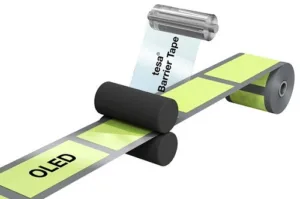Germany’s Federal Ministry of Education and Research (BMBF) is launched a new project aiming to develop flexible glass for OLED applications.
The Konfect project will receive €5.6 million in funding and will last for three years. It is seeking to refine windable glass through lamination with functional adhesive tapes, and by applying ‘special functional layers’. It is hoped that this will lead to a process-ready rolled substrate.
Three companies are part of the project at its launch: Schott, Tesa and Von Ardenne. Two features of thin glass are being focused on: first, the development of a laminate ultra-thin glass with a barrier adhesive tape, which will serve as a hermetic encapsulation of electronic components; second, examining the ways in which ultra-thin glass can be used as a substrate for ‘demanding’ applications.
Schott and Tesa are working together on the first of these sub-projects, to protect components such as OLEDs from humidity and oxygen. Flexible glass is well-suited to this, as it forms a chemically-impermeable layer. The adhesive layer, developed by Tesa, will seal the components hermetically and ensure that there is no lateral diffusion of liquids and gases.
Von Ardenne is concentrating on the second sub-project. The company is developing a vacuum coating system specifically for roll-to-toll coating of flexible glass, which will meet the component’s special handling requirements. For example, a conductive layer such as ITO is applied in a vacuum-based physical vapour deposition process, in the same manner as OLEDs are produced.

